Overview
Choosing the right in-home care service for your loved one can feel overwhelming. It’s essential to assess their specific needs and explore local agencies that can provide the support they deserve. Take the time to evaluate the qualifications and reputation of potential providers, as this can significantly impact their well-being.
Personalized care plans are vital in ensuring that the service meets individual requirements. Open communication with caregivers is equally important; it fosters trust and understanding, which enhances the quality of life for seniors. Remember, your loved one’s comfort and happiness are our top priorities.
In this journey, know that you are not alone. We’re here for you, ready to help you navigate through these decisions with compassion and care. Together, we can find the perfect fit for your family’s needs.
Introduction
In-home care services are becoming an increasingly vital resource for families seeking to support their loved ones in a comfortable and familiar environment. As our aging population grows, the demand for personalized care solutions that cater to individual needs also rises. This allows seniors to maintain their independence while receiving the necessary assistance they deserve.
From personal care and companionship to skilled nursing and therapy, the variety of services available can feel overwhelming. It’s important to understand that you are not alone in this journey. This article delves into the essential aspects of in-home care, exploring the types of services offered and key factors in choosing the right provider.
We will also discuss the importance of personalized care plans, highlighting how Best Care Nurses Registry stands out as a trusted partner in enhancing the quality of life for seniors. Remember, your comfort and peace of mind are our priority, and we’re here to support you every step of the way.
Understanding In-Home Care Services: An Overview
Best Care Nurses Registry offers in-home care services nearby, providing a comprehensive range of support tailored for individuals who need assistance with daily activities or medical needs within the comfort of their own homes. These services include personal assistance, companionship, skilled nursing, and therapy, all aimed at enhancing the quality of life for seniors and individuals with disabilities. As of 2025, approximately 25% of seniors are utilizing in-home assistance options, reflecting a growing trend towards personalized support solutions that prioritize independence and comfort.
Understanding the various types of in-home care services available is crucial for families seeking the best help for their loved ones. For example, home health aides and personal assistance aides play a vital role in assisting clients with daily living activities, such as personal hygiene, meal preparation, and transportation. They also provide essential health-related support under the supervision of healthcare practitioners, ensuring that clients receive the necessary medical attention while maintaining their independence.
These caregivers are essential in promoting clients’ well-being, as they help monitor the support provided and communicate any changes in clients’ conditions.
The importance of selecting the right in-home care service cannot be overstated. Families should consider factors such as the provider’s reputation, the credentials of caregivers, and the flexibility of available options. Best Care Nurses Registry stands out as a prominent family-owned provider of in-home care services in South Florida, offering personalized support and adaptable solutions.
With the average base pay for certified caregivers at $15.65 per hour, it is vital to ensure that the chosen provider can deliver high-quality assistance without sacrificing affordability. This affordability is a key aspect of the value that Best Care Nurses Registry brings to families.
Recent trends indicate a significant shift in the in-home care service landscape, particularly following the COVID-19 pandemic, which has impacted adult day centers and increased the demand for home-based assistance. The pandemic has heightened the focus on safety and individualized support, as families aim to minimize exposure to larger facilities. As vaccine distribution continues, there is hope for recovery and growth in this sector.
Expert insights highlight that in-home care services not only alleviate the burden on families but also enhance the overall wellness of seniors by providing tailored, compassionate support.
In conclusion, the effectiveness of in-home assistance is evident through successful applications that focus on the unique needs of clients. By thoughtfully selecting a provider like Best Care Nurses Registry that aligns with specific requirements, families can ensure a safe and nurturing environment for their loved ones, ultimately improving their quality of life. We’re here for you—call now to get started or schedule a call to discuss your needs.
Types of In-Home Care Services: What You Need to Know
In-home care services nearby offer a range of essential support options tailored to meet the diverse needs of seniors. These services can be categorized as follows:
- Personal Care Assistance: Focusing on daily tasks such as bathing, dressing, grooming, and mobility support, these offerings ensure that seniors maintain their dignity and personal hygiene. With Best Care Nurses Registry, all support providers are thoroughly vetted and committed to excellence, providing customized care solutions that enhance the quality of life for seniors.
- Companionship Services: Designed to foster social interaction and emotional support, companionship services help alleviate feelings of loneliness and isolation, which are often experienced by the elderly. The emotional comfort provided by our caregivers allows families to reconnect and prioritize their own well-being, secure in the knowledge that their loved ones are in safe hands.
- Skilled Nursing Services: This encompasses medical assistance from registered nurses (RNs) or licensed practical nurses (LPNs). Services may include medication management, wound care, and other health-related tasks requiring professional expertise, ensuring seniors receive the necessary medical attention to maintain their health.
- Therapy Services: Physical, occupational, or speech therapy can significantly aid recovery and improve daily functioning for seniors facing mobility challenges or rehabilitation needs. These services are crucial for preserving autonomy and enhancing overall quality of life.
- Homemaker Assistance: This support aids with household tasks like cleaning, cooking, and laundry, allowing seniors to live in a clean and organized environment without the stress of managing these chores alone. This assistance not only enhances safety but also contributes to a more enjoyable living experience.
Understanding these categories is vital for families looking to create a personalized support plan for their loved ones. In 2020, approximately 3.0 million patients received in-home assistance, highlighting the growing reliance on such services as the elderly population continues to expand. It is essential to ensure that the elderly community is well cared for in their later years, underscoring the importance of in-home care services nearby.
Furthermore, research, including the case study titled ‘Optimizing Home Health Settings,’ indicates that home modifications and training interventions can improve safety and independence for older adults, thereby reducing the need for extensive home health support. As we look to 2025, the landscape of at-home support options continues to evolve, with a focus on enhancing the quality of life for seniors. By selecting the right combination of services from Best Care Nurses Registry, families can ensure their loved ones receive the compassionate and professional support they deserve.
Call (888) 203-2529 to discuss your needs and explore how Best Care Nurses Registry can assist your loved ones.
Neglecting to utilize caregiver services can lead to serious consequences, including health decline, poor nutrition, hygiene issues, and an increased risk of social isolation. It is crucial to recognize these risks and take proactive steps to safeguard the well-being of seniors.
Key Factors to Consider When Choosing In-Home Care
When choosing an in-home care option, it is crucial to take into account several key factors to ensure the best fit for your loved one:
- Recognizing the Requirement for Assistance: Start by observing your loved one’s everyday life for signs that they might benefit from companionship or sitter support. Key indicators include feelings of loneliness or withdrawal, and difficulty with daily tasks like cooking, cleaning, or managing medications. Safety concerns, such as frequent falls or accidents, also suggest the need for additional support.
- Licensing and Accreditation: Verify that the agency holds the necessary licenses and accreditations from relevant state authorities. This ensures compliance with industry standards and regulations, which is vital for quality care.
- Reputation: Investigate the agency’s reputation by reading reviews and testimonials from other families. A solid reputation often reflects the agency’s commitment to delivering top-notch services and client satisfaction. Assistance Available: Confirm that the agency provides the specific support your loved one needs, whether it’s personal care, companionship, or skilled nursing. Tailored services are essential for effectively meeting individual needs.
- Provider Qualifications: Inquire about the training and credentials of the providers. With around 43.5 million individuals in the U.S. offering support, understanding their expertise can instill confidence in the quality of assistance your loved one will receive. This is particularly significant considering the gender disparities in caregiving roles, where most caregivers are female, often influencing the dynamics of assistance. Compatibility: Assess how well the support providers align with your loved one’s personality and preferences. A good match can significantly enhance the comfort and effectiveness of care.
- Availability: Verify the agency’s ability to meet your required hours and their flexibility in accommodating changes in support needs. This is particularly important as health conditions can evolve over time.
- Technology Utilization: Consider how the agency integrates technology, such as telehealth and caregiver mobile applications, to improve service delivery. This is becoming increasingly important in the home care industry, especially in 2025.
- Aging in Place: Recognize the trend of older Americans expressing a strong desire to age in place, highlighting the importance of choosing an option that accommodates this preference. Transitioning to Assistance: Transitioning a loved one to utilizing companion or sitter support can be a delicate process that requires sensitivity and communication. Begin by exploring the advantages of having a companion, emphasizing how the assistance can enhance their quality of life and maintain their independence. Involve your loved one in the selection process, allowing them to meet and interact with potential companions to ensure a good fit. Gradually introduce the services, starting with brief visits and extending the duration as your loved one feels more comfortable.
By thoughtfully assessing these elements, you can refine your choices and select a provider, like Best Care Nurses Registry, that aligns with your family’s needs for in-home care services, ensuring a supportive and caring environment for your loved one. Furthermore, with 89% of patients satisfied with home healthcare services, understanding these factors can help you navigate the complexities of selecting the right in-home care service in 2025.
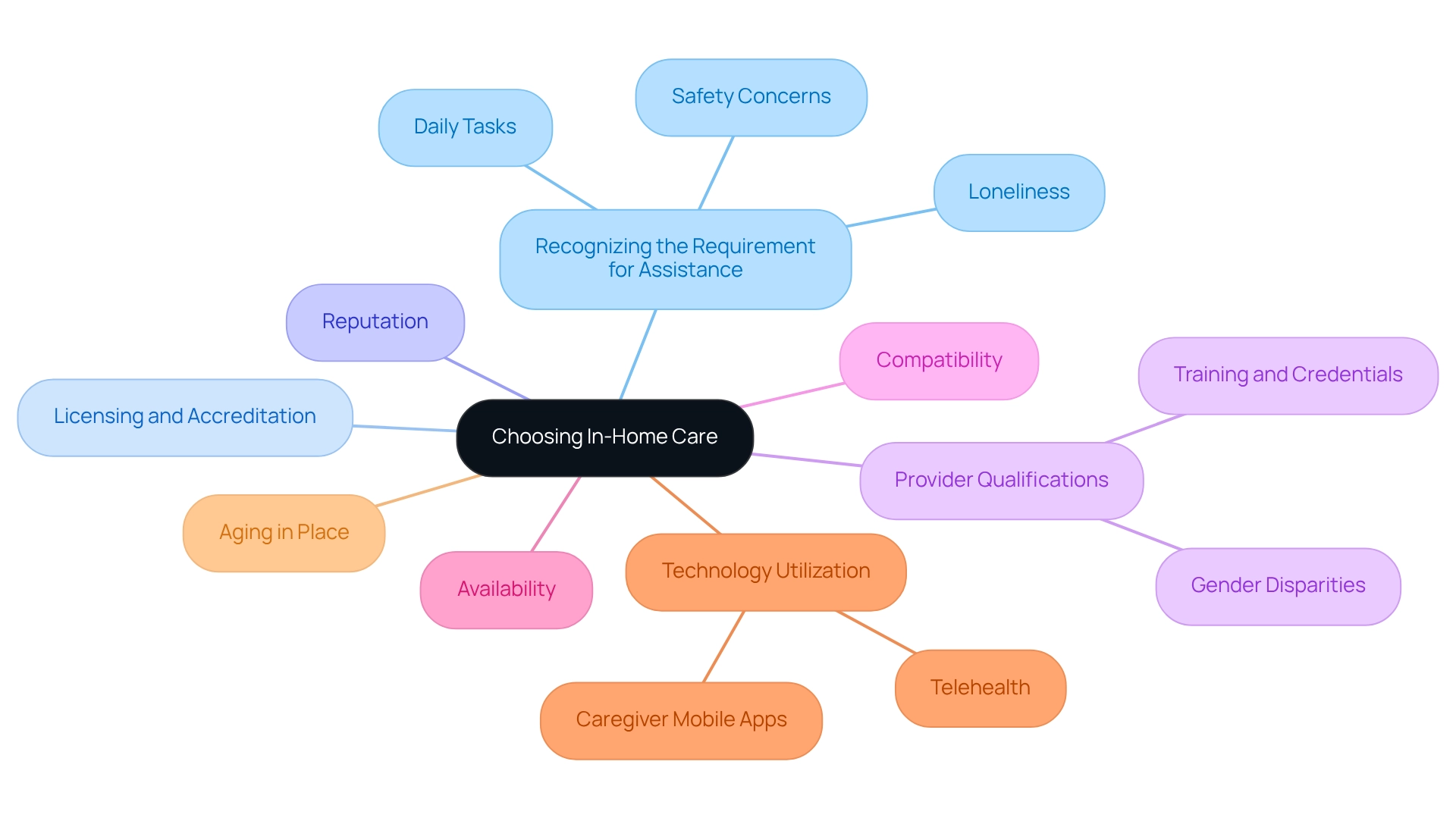
Evaluating Caregiver Qualifications and Experience
To ensure high standards of support, it is crucial to assess the following elements of provider qualifications:
- Training and Certification: Confirm that attendants have completed necessary training programs and hold relevant certifications, such as Certified Nursing Assistant (CNA) or Home Health Aide (HHA). This structured education is essential, as it provides support providers with the skills required to deliver effective assistance, including medical tasks for CNAs and personal attention for HHAs.
- Experience: Ask about the provider’s background, especially concerning particular conditions or needs relevant to your loved one. For example, those who have collaborated with individuals experiencing Alzheimer’s or Parkinson’s disease may provide specialized insights and techniques that improve care quality.
- Background Checks: Ensure that the agency conducts thorough background checks on all personnel. This step is crucial for ensuring safety and reliability, as it assists in reducing risks linked with employing individuals who may not have a trustworthy history.
- Continuous Education: Inquire whether the agency offers continuous education for support workers to keep them informed about best practices in assistance. Ongoing education is crucial in the constantly changing area of home health, where new methods and information can greatly influence patient results.
- Dialogue: Maintain open dialogue with the provider and the home support agency. Regularly check in with your loved one to discuss their experiences and any concerns. Request periodic updates from the provider and consider unannounced visits to observe the care delivered.
By carefully evaluating these qualifications, you can select individuals who are not only skilled but also trustworthy and compassionate. Additionally, consider the indicators suggesting the need for in-home care services, such as difficulty with personal hygiene, dressing, cooking, cleaning, or managing medications. CNAs and HHAs offer in-home care services by assisting patients of all ages with daily living activities, including bathing, grooming, meal preparation, and light housekeeping.
With around 5.5 million individuals in the U.S. supporting military personnel, many of whom report heightened stress and anxiety due to their duties, the significance of choosing well-trained and qualified support providers cannot be overstated. Family supporters dedicate an average of 22.3 hours each week offering assistance, emphasizing the considerable time investment required. This diligence guarantees that your loved ones receive the highest standard of attention, customized to their unique needs.
Additionally, organizations like FCA offer direct support services for caregivers of individuals with debilitating disorders, emphasizing the need for specialized support in this critical role. For more information, contact Best Care Nurses Registry at (888) 203-2529.
The Importance of Personalized Care Plans
Customized support plans are essential for providing effective in-home care services for seniors. These plans should encompass several key elements to truly meet individual needs.
- Assessment of Needs: A comprehensive evaluation of an individual’s physical, emotional, and social requirements is crucial. This evaluation lays the groundwork for tailoring support to address specific needs. Indicators suggesting the need for CNA/HHA support services include challenges with personal hygiene, dressing, cooking, cleaning, or managing medications. Health issues such as chronic conditions, frequent hospital stays, or recent surgeries requiring ongoing support are also significant factors to consider.
- Goals and Objectives: Establishing clear and measurable goals is vital. These objectives might include enhancing mobility, improving daily living skills, or fostering social interactions, all aimed at promoting independence and enhancing quality of life.
- Caregiver Assignments: Allocating caregivers based on compatibility and expertise ensures that individuals receive assistance from someone who understands their unique circumstances. CNAs (Certified Nursing Assistants) typically undergo more comprehensive training focused on medical duties, while HHAs (Home Health Aides) concentrate on personal assistance and daily living activities. This personalized matching fosters trust and comfort, which are essential for effective care.
- Regular Reviews: Implementing ongoing evaluations allows for modifications to the support plan as needs change. Regular assessments ensure that the support remains relevant and effective, adapting to any changes in health or circumstances. Maintaining open communication with the provider and the home support agency is crucial for quality assistance. Regular check-ins with your loved one and periodic updates from the caregiver can help address any concerns promptly. Additionally, unannounced visits to observe the services offered can further enhance quality assurance.
The significance of individualized service plans cannot be overstated. Research shows that such tailored approaches can lead to significant improvements in health outcomes and patient satisfaction. For instance, customized home assistance services can result in substantial cost reductions compared to conventional in-clinic treatment, with potential savings ranging from $47.70 to $9,146.80 per service.
Moreover, involving relatives in the support process through these tailored plans fosters stronger connections and enhances coordination, reducing the likelihood of duplicating services. By focusing on individualized support, families can ensure that their loved ones receive the most suitable and effective assistance, ultimately leading to improved health outcomes and a better quality of life.
Insights from case studies highlight that personalized support models not only boost patient satisfaction but also indicate potential cost savings and superior quality of service in managing chronic conditions. By leveraging Best Care Nurses Registry’s extensive experience and solid reputation in in-home care services, families can trust that personalized support plans will deliver the most effective assistance for their loved ones.
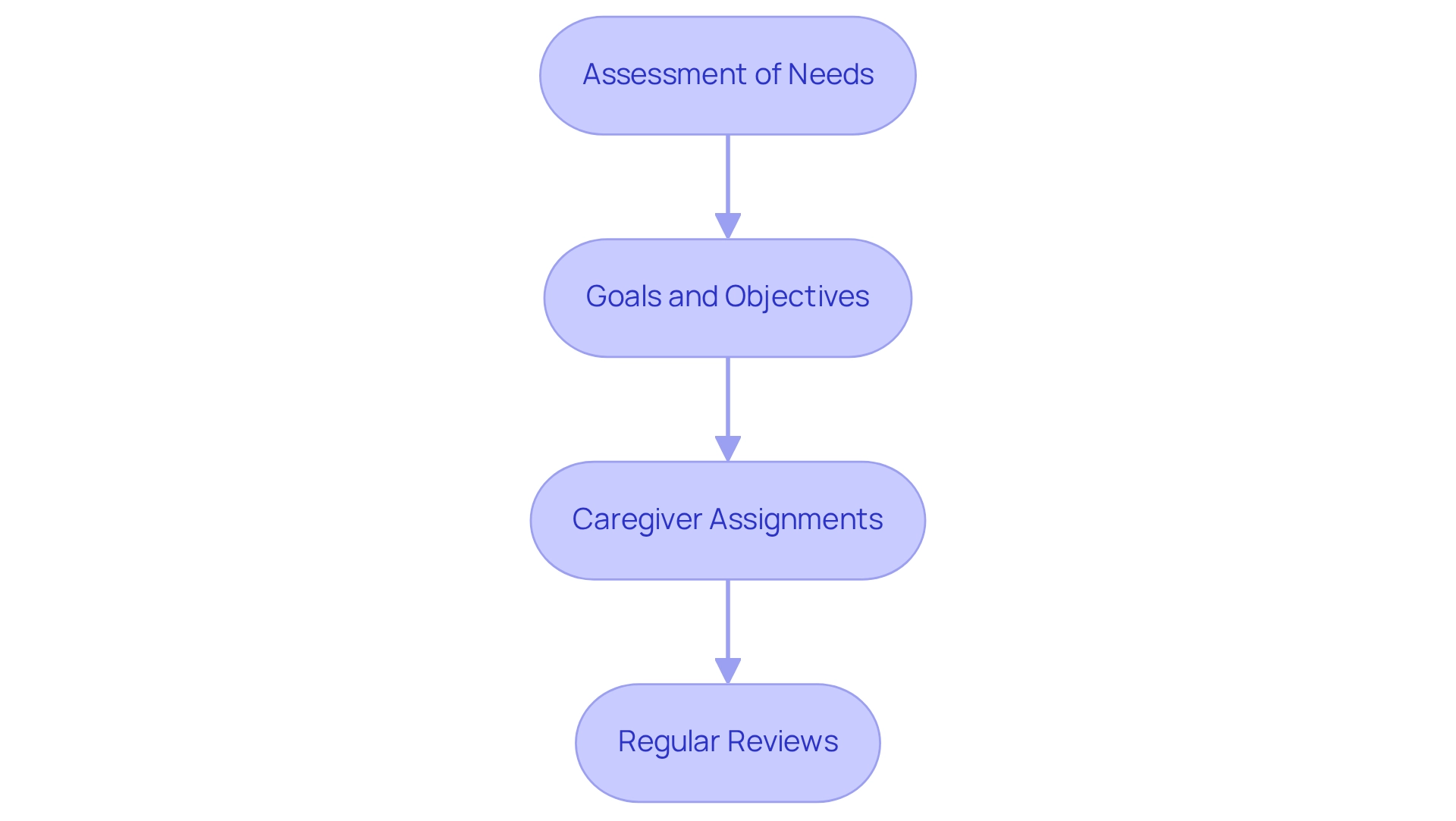
Involving Family in the Care Process: A Collaborative Approach
Engaging relatives in the care process can significantly enhance the quality of care provided, particularly when utilizing in-home care services from Best Care Nurses Registry. Here are some effective strategies to encourage family involvement:
- Regular Communication: Establishing open lines of communication between caregivers and relatives is vital. Frequent conversations about support plans and progress ensure that everyone stays informed and engaged in the assistance process. This is essential for maintaining safety and emotional support for seniors.
- Collaborative Decision-Making: Involving relatives in decisions regarding treatment strategies fosters a cooperative atmosphere. When families participate in adjustments to the support plan, it not only respects their perspectives but also enhances the overall effectiveness of the care provided, ensuring it meets the unique needs of the individual.
- Support Roles: Assigning specific roles to relatives, such as coordinating appointments or providing companionship, can instill a sense of involvement and responsibility. This not only alleviates some of the caregiving burden but also strengthens relationships among family members, creating a supportive network that benefits both the caregiver and the individual receiving assistance.
- Education: Educating relatives about the support process and the specific needs of their loved one empowers them to participate effectively. Understanding health conditions and caregiving methods can boost their confidence and ability to assist, transforming home health care into a more effective solution.
Studies indicate that relatives providing care often engage in various activities, including assistance with daily living tasks, emotional support, and care coordination. The effectiveness of these support providers is influenced by their values, preferences, and available healthcare resources. A case study titled ‘Roles of Relatives in Care’ showcases the diverse activities that relatives undertake, illustrating the collaborative approach discussed.
Moreover, statistics reveal that the typical caregiver for an individual aged 50 or older spends approximately $5,531 each year on out-of-pocket caregiving costs. This underscores the financial and emotional commitment involved. Such statistics highlight the importance of family involvement in alleviating some of these burdens, especially when choosing in-home care services from Best Care Nurses Registry, which can offer a more convenient and effective alternative.
Additionally, the literature points to a lack of theoretical frameworks guiding family involvement in caregiving, indicating a need for structured approaches to encourage participation. As Valerie Tolbert notes, effective communication between support providers and relatives is crucial for fostering collaboration and improving treatment outcomes.
This collaborative approach not only enhances treatment results but also strengthens family bonds, creating a supportive network that benefits both the provider and the individual receiving assistance.
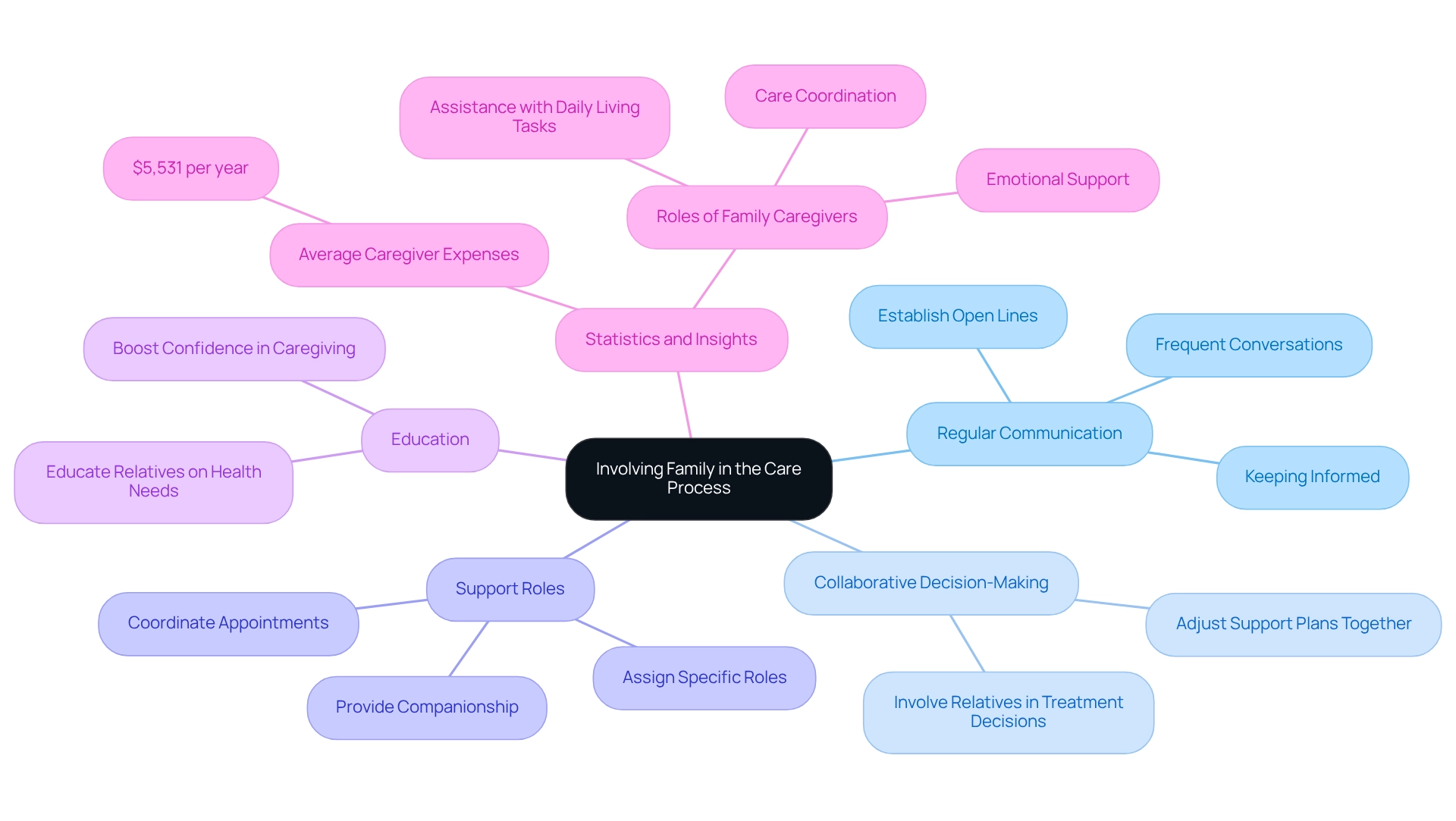
Understanding Costs and Insurance Options for In-Home Care
When considering in-home care, it’s essential to understand the associated costs and available insurance options to make informed decisions that truly support your loved ones:
- Cost Breakdown: In-home assistance expenses can vary significantly based on the type of support needed, the caregiver’s qualifications, and the frequency of help. In 2025, the typical hourly rate for in-home assistance ranges from $20 to $50, depending on the complexity of support required. For families exploring long-term support choices, it’s important to note that the annual expense for a nursing home facility (private room) reached $116,800 in 2023, highlighting the potential savings of in-home care services.
- Insurance Coverage: It’s crucial to verify whether your loved one’s health insurance, Medicare, or Medicaid includes any in-home assistance options. Many long-term care insurance policies may provide coverage for these services, but specifics can vary widely. At Best Care Nurses Registry, we accept most Long Term Care insurances directly on your behalf, requiring a form called an Assignment of Benefits (AOB) to be completed by the policyholder. This allows you to direct the carrier to pay us directly, and we handle all necessary paperwork with the carrier. However, it’s important to understand that Medicare does not cover activities of daily living provided by private duty caregivers, focusing instead on skilled visits. By grasping the nuances of these policies, families can maximize their benefits from in-home care services and reduce out-of-pocket expenses.
- Payment Options: Discussing payment options with the agency is vital. Many agencies offer various payment methods, including private pay, sliding scale fees, and potential financial assistance programs. Families with good credit might also consider bank loan options to help cover in-home assistance expenses, providing additional financial flexibility. As Laura Adams wisely noted, “If you spend all your money on your aging parents, you’re going to be relying on loved ones to pay for you. It’s a downward spiral,” which underscores the importance of financial planning.
- Budgeting: Developing a detailed budget that considers ongoing expenses is essential. Families should account for all potential expenses when exploring in-home care services and seek ways to manage these effectively. This includes understanding daily expenses related to various forms of assistance, as highlighted in the case study titled “How Much Does In-Home Assistance Cost Per Day?” This research offers a comprehensive examination of daily costs for different support services, helping families navigate the financial landscape of elderly assistance. Such insights can empower households to make informed choices about the in-home care services their loved ones truly need.
By understanding these financial elements, families can navigate the complexities of in-home assistance while ensuring their loved ones receive the essential support they deserve, all while preserving financial stability.
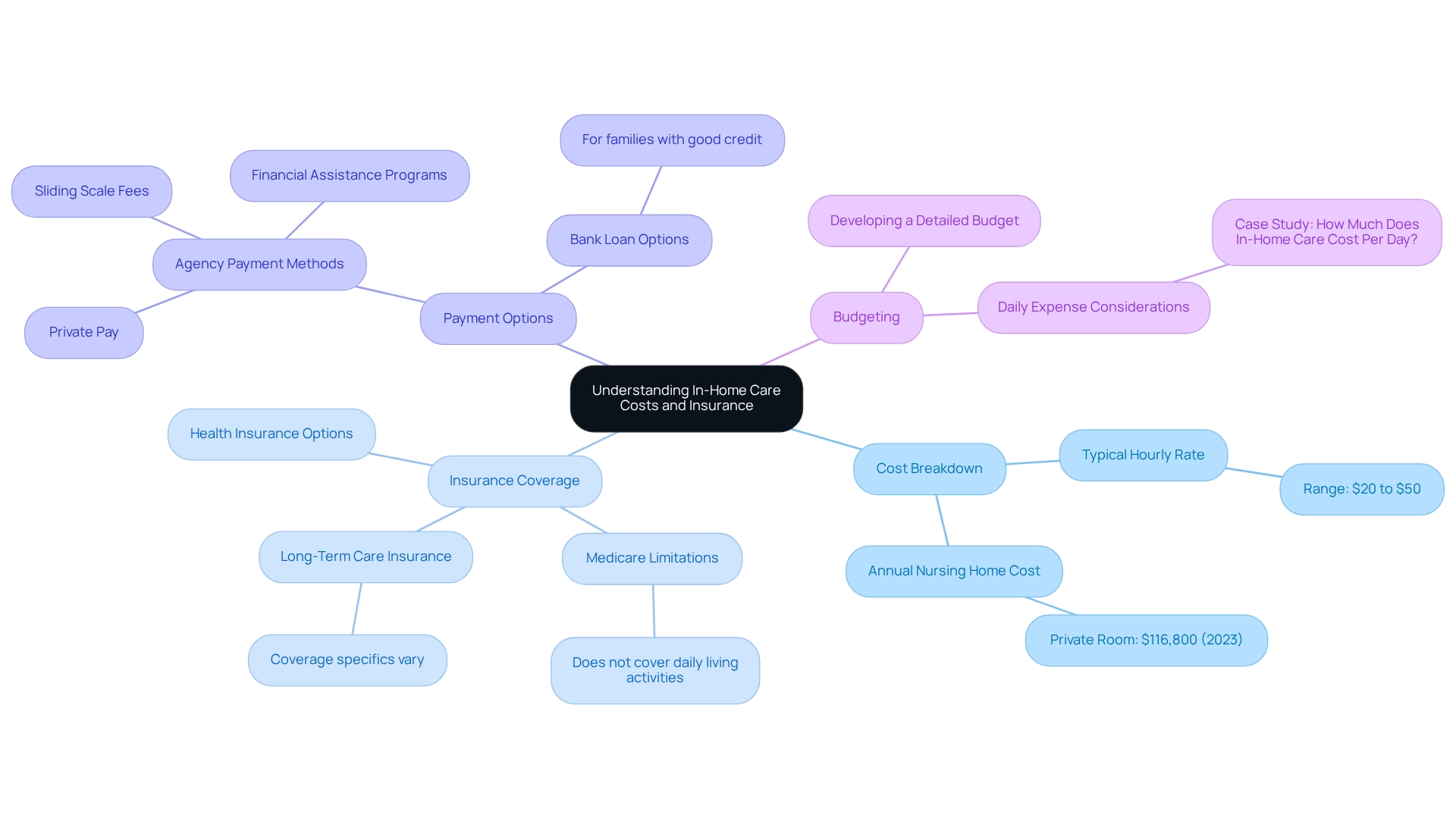
Practical Steps to Find the Right In-Home Care Service Near You
Finding the right in-home assistance service can be a daunting task, but by following these practical steps, you can ensure that your loved ones receive the compassionate care they deserve.
Assess Needs: Start by evaluating the specific needs of your loved one. What type of assistance is required—personal support, companionship, or skilled nursing? Consider the preferred schedule for support as well. If your loved one is struggling with personal hygiene, dressing, cooking, cleaning, or managing medications, it may be time to seek CNA/HHA support services. Remember, 96% of caregivers of veterans are female, often caring for spouses or partners, which highlights the unique challenges they face.
Research Local Agencies: Utilize online resources, community referrals, and local directories to compile a list of potential in-home care providers in your area. Many families find that local agencies can offer tailored services that meet their specific needs. It’s important to note that most support recipients (48%) reside in their own homes, while 35% live in their provider’s home, which can influence your choice of service.
Check Reviews and Ratings: Investigate reviews and ratings from other families to assess the quality of service provided by each agency. These insights can be invaluable in identifying reputable providers. Without adequate support for caregivers, seniors may face health deterioration, inadequate nutrition, hygiene issues, and increased risks of social isolation and home dangers.
Interview Providers: Arrange meetings with prospective agencies to discuss their offerings, support worker qualifications, and care plans. This is your opportunity to ask specific questions about their approach to care and how they handle unique situations. Consider the economic impact of caregiving; the estimated value of relatives’ services is $306 billion annually, underscoring the importance of choosing the right provider.
Visit Facilities: If possible, visit the agency’s office to meet staff and observe their operations. This firsthand experience can help you assess the professionalism and environment of the agency. Additionally, a case study on caregiving hours reveals that older providers often face rising demands, impacting their ability to deliver assistance.
Trust Your Instincts: Ultimately, choose a provider that feels right for your family. Reflect on both the professional qualifications of the caregivers and the personal rapport established during your interactions. It’s also crucial to recognize that 38% of veteran assistance recipients post-9/11 meet criteria for likely depression, highlighting the emotional and mental health factors in support.
By following these steps, families can confidently select an in-home care service that meets their needs, ensuring their loved ones receive the individualized attention they deserve. For personalized support consultation, reach out to Best Care Nurses Registry to discuss your specific requirements and develop a customized home health solution.
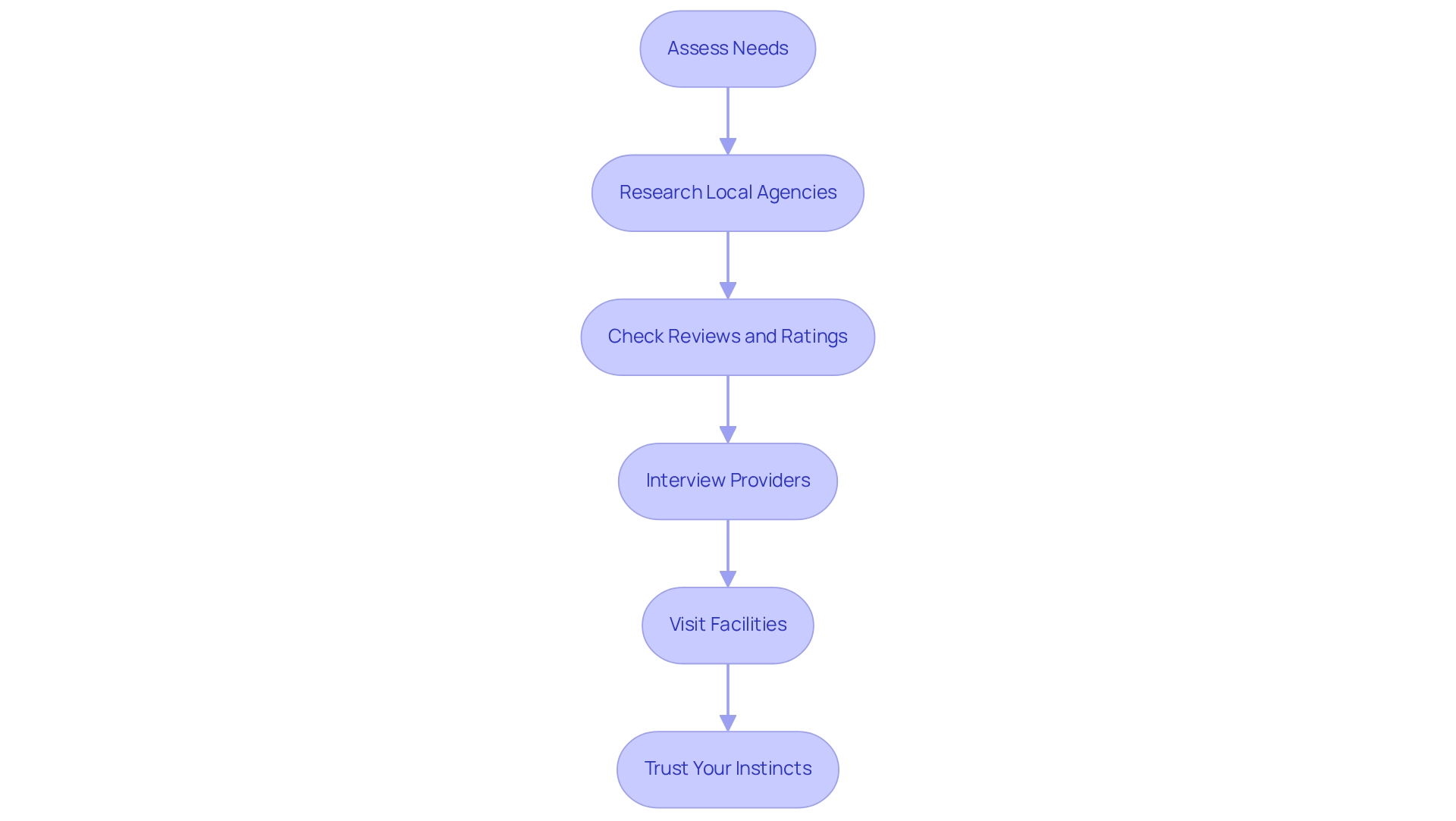
Essential Questions to Ask Potential In-Home Care Providers
When interviewing potential in-home assistance providers, it is crucial to ask the following essential questions to ensure the best fit for your loved one:
- What assistance do you provide? Confirm that the agency offers the specific assistance needed, such as personal care, companionship, or skilled nursing. Understanding the range of services available can help you identify if they meet your loved one’s needs.
- What are your qualifications for providing care? Ask about the training, certifications, and experience of the caregivers to ensure they fulfill the required standards for assistance. For example, Certified Nursing Assistants (CNAs) undergo comprehensive training centered on medical duties, whereas Home Health Aides (HHAs) are educated in personal assistance and daily living activities. The NCCDP staff consists of a full team of experts in dementia care and education, which can be particularly important for seniors with specific health concerns. It is essential to understand the qualifications of those providing care to ensure they can offer the necessary support.
- How do you handle emergencies? Understand the agency’s protocols for managing emergencies and unexpected situations, ensuring that your loved one will be safe and well-cared for. Knowing that the agency has established protocols for medical emergencies can provide reassurance to families.
- Can you provide references? Request references from other families who have utilized their services to gauge satisfaction and reliability. Hearing from others can help you assess the agency’s reputation and trustworthiness.
- What is your policy on support continuity? Discover how the agency guarantees that your loved one will have consistent support, which is essential for fostering trust and comfort. Consistency among providers can significantly improve the quality of care.
- How do you track the performance of those providing care? Learn about the agency’s methods for evaluating the quality of support providers and client satisfaction, including regular assessments and feedback mechanisms. Regular monitoring and adjustment of the support plan are necessary to adapt to changing needs and ensure effective assistance.
- How do you ensure open communication? It is essential to uphold transparent communication with both the caregiver and the home assistance agency to guarantee quality support. Regular check-ins and discussions about your loved one’s experiences can help address any concerns promptly.
These questions are designed to help you thoroughly assess the suitability of potential in-home care service providers, ensuring that your loved one receives the highest quality of care tailored to their unique needs. As highlighted by Eastleigh Care Homes, offering a transparent and informative visit experience is crucial for assisting relatives in making the best choice for their loved ones. Additionally, understanding the physical stamina and strength required for caregiving can reinforce the importance of asking about caregiver qualifications and performance monitoring. At Best Care Nurses Registry, we prioritize compassionate care and effective communication to support families in their caregiving journey.
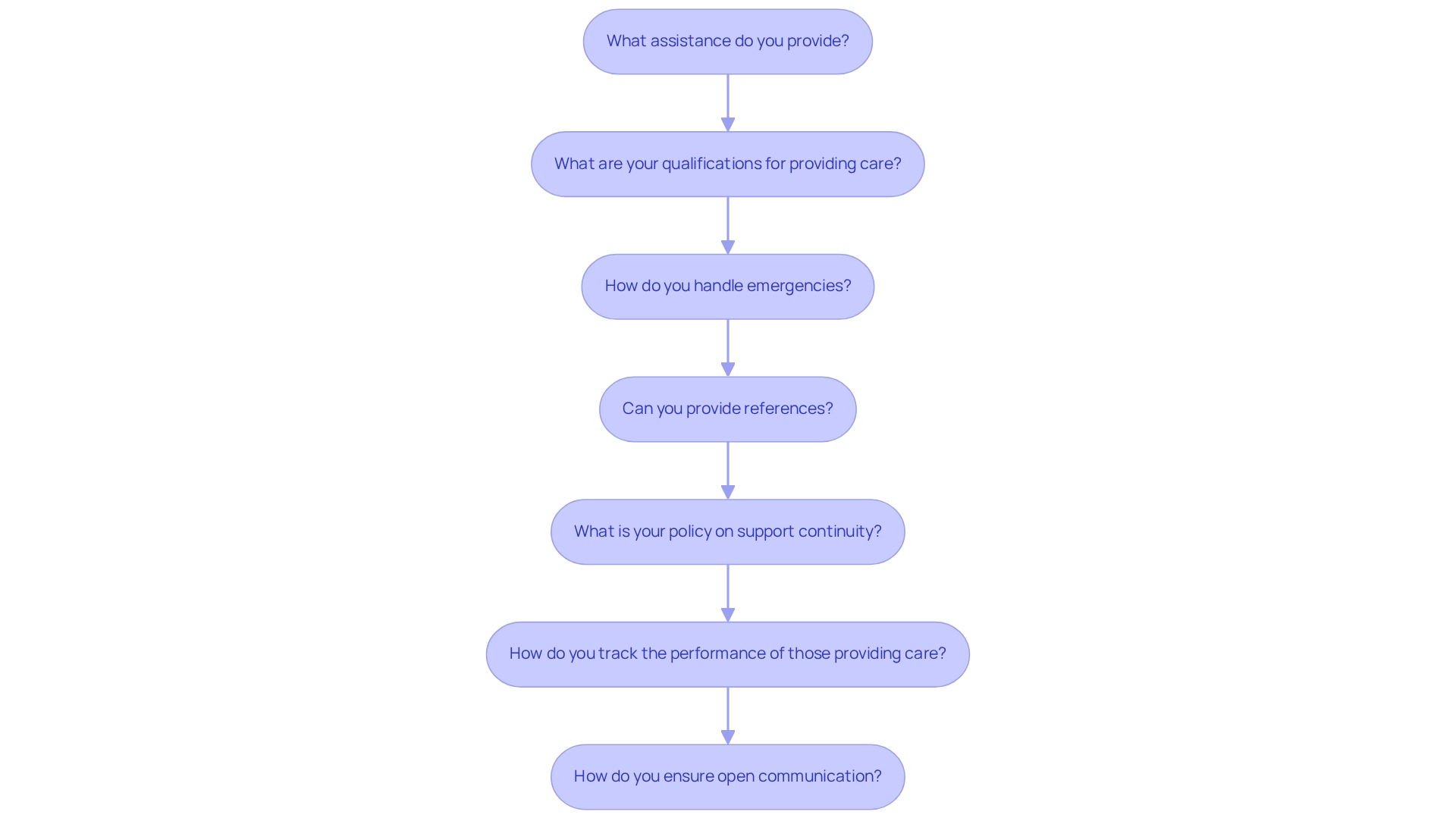
Conclusion
In-home care services are essential in supporting seniors and individuals with disabilities, enabling them to maintain their independence in a familiar environment. With a variety of services available—from personal care and companionship to skilled nursing and therapy—families can find tailored solutions that meet their loved ones’ unique needs. Recognizing these services is crucial for making informed decisions that enhance the quality of life for seniors.
Choosing the right in-home care provider is vital for ensuring effective support. Factors such as the agency’s reputation, caregiver qualifications, and the flexibility of services offered can significantly impact the care experience. Best Care Nurses Registry stands out as a trusted partner, dedicated to delivering personalized care plans that prioritize clients’ well-being while remaining affordable.
As the demand for in-home care continues to grow, especially following the COVID-19 pandemic, families are increasingly acknowledging the importance of involving their loved ones in the care process. This collaborative approach not only enhances the effectiveness of care but also strengthens family bonds, creating a supportive environment that benefits both caregivers and recipients.
Ultimately, by carefully evaluating potential providers and understanding the financial aspects of in-home care, families can secure the best possible care for their loved ones. Emphasizing personalized care plans and open communication leads to improved health outcomes and a better quality of life for seniors, reinforcing the invaluable role of in-home care services in our communities. We’re here for you, and your comfort is our priority.
Frequently Asked Questions
What types of in-home care services are offered by Best Care Nurses Registry?
Best Care Nurses Registry offers a range of in-home care services including personal care assistance, companionship services, skilled nursing services, therapy services, and homemaker assistance, all tailored to meet the diverse needs of seniors.
How do personal care assistance services help seniors?
Personal care assistance services help seniors with daily tasks such as bathing, dressing, grooming, and mobility support, ensuring they maintain their dignity and personal hygiene.
What is the role of companionship services in in-home care?
Companionship services provide social interaction and emotional support to alleviate feelings of loneliness and isolation among seniors, promoting their emotional well-being.
What skilled nursing services are available through Best Care Nurses Registry?
Skilled nursing services include medical assistance from registered nurses or licensed practical nurses, covering tasks such as medication management, wound care, and other health-related needs.
How do therapy services benefit seniors?
Therapy services, including physical, occupational, or speech therapy, assist seniors in recovery and improving daily functioning, which is crucial for preserving their autonomy and enhancing their quality of life.
What factors should families consider when selecting an in-home care service?
Families should consider the provider’s reputation, licensing and accreditation, caregiver qualifications, compatibility with the client, availability, technology utilization, and the desire for aging in place.
Why is it important to choose the right in-home care service?
Selecting the right in-home care service is essential for ensuring that loved ones receive the appropriate support tailored to their needs, which can significantly enhance their quality of life.
What is the average pay for certified caregivers, and why is this important?
The average base pay for certified caregivers is $15.65 per hour. This is important as families need to ensure that they can afford high-quality assistance without compromising on care.
How has the COVID-19 pandemic affected the demand for in-home care services?
The COVID-19 pandemic has increased the demand for home-based assistance as families aim to minimize exposure to larger facilities, leading to a greater focus on safety and individualized support.
What are the consequences of neglecting to utilize caregiver services for seniors?
Neglecting caregiver services can lead to serious consequences for seniors, including health decline, poor nutrition, hygiene issues, and an increased risk of social isolation.











